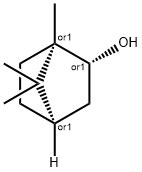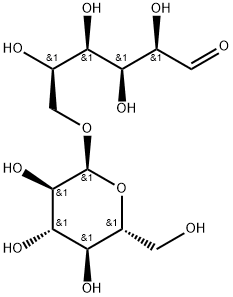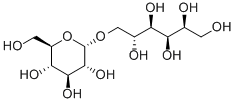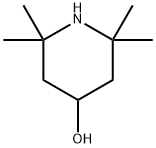A5066312
Isoborneol , ≥90.0%(GC) , 124-76-5
Synonym(s):
Isoborneol
CAS NO.:124-76-5
Empirical Formula: C10H18O
Molecular Weight: 154.25
MDL number: MFCD00074821
EINECS: 204-712-4
| Pack Size | Price | Stock | Quantity |
| 5g | RMB26.40 | In Stock |
|
| 25G | RMB48.80 | In Stock |
|
| 100G | RMB145.60 | In Stock |
|
| 500G | RMB296.00 | In Stock |
|
| others | Enquire |
Update time: 2022-07-08
PRODUCT Properties
| Melting point: | 212-214 °C (subl.)(lit.) |
| Boiling point: | 214°C |
| Density | 0.8389 (rough estimate) |
| vapor pressure | 0.057-4.706Pa at 25℃ |
| FEMA | 2158 | ISOBORNEOL |
| refractive index | 1.4710 (estimate) |
| Flash point: | 200 °F |
| storage temp. | 2-8°C |
| solubility | almost transparency in Methanol |
| form | Powder |
| pka | 15.36±0.60(Predicted) |
| color | Yellow |
| Odor | at 10.00 % in dipropylene glycol. balsam camphor herbal woody |
| Odor Type | balsamic |
| biological source | synthetic |
| Water Solubility | insoluble |
| Merck | 14,5128 |
| JECFA Number | 1386 |
| BRN | 4126091 |
| LogP | 2.32-2.92 at 20-25℃ |
| CAS DataBase Reference | 124-76-5(CAS DataBase Reference) |
| NIST Chemistry Reference | DL-Isoborneol(124-76-5) |
| EPA Substance Registry System | Isoborneol (124-76-5) |
Description and Uses
Isoborneol has a piney, camphoraceous odor. May be prepared by the hydrolysis of isobomyl acetate, or by catalytic reduction of camphor (both d- and ι-isomers); the optically inactive compound can be prepared by treating camphene with a 1:1 mixture of sulfuric acid and glacial acetic acid and then hydrolyzing the isobomyl acetat.
Used as a synthetic flavor, as a moth repellent, cold sore topical medication, muscle liniment, and steam-inhaled cough suppressant. It is also used in Used in perfumes.
Safety
| Symbol(GHS) |   GHS02,GHS07 |
| Signal word | Danger |
| Hazard statements | H228-H315 |
| Precautionary statements | P210-P302+P352 |
| Hazard Codes | F,Xi |
| Risk Statements | 11-38 |
| Safety Statements | 24/25 |
| RIDADR | UN 1312 4.1/PG 3 |
| WGK Germany | 2 |
| RTECS | NP7300000 |
| TSCA | Yes |
| HazardClass | 4.1 |
| HS Code | 29061900 |
| Hazardous Substances Data | 124-76-5(Hazardous Substances Data) |
| Toxicity | mouse,LD50,intravenous,56mg/kg (56mg/kg),U.S. Army Armament Research & Development Command, Chemical Systems Laboratory, NIOSH Exchange Chemicals. Vol. NX#03209, |






